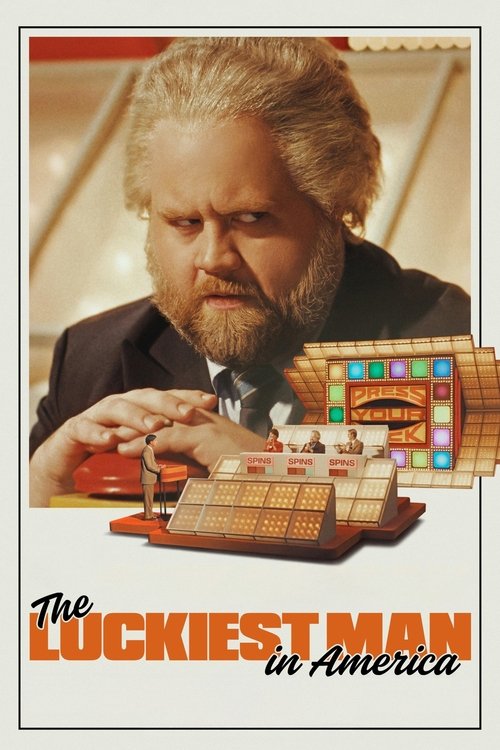The Luckiest Man in America

Plot
Michael Larson, an Ohioan with a passion for game shows, changed the course of history with his incredible run on "Press Your Luck" in 1983. At the height of Larson's winning spree, he became a household name, captivating audiences across America with his peculiar talent for beating the odds. Behind this unexpected victory, however, lied a complex web of strategy and calculation that soon threatened to expose him as an unusually fortunate individual. The stakes rose high when game show producers realized Larson's winning streak wasn't due to mere chance but rather deliberate manipulation. His skillful strategy relied on observing the game's random number generator – specifically a deterministic pattern - embedded within the show's unpredictable sequence. Larson knew the underlying mechanics as an expert and, upon gaining familiarity with it, planned his moves to increase his winning chances significantly. Larson's tactics raised eyebrows among those involved in the behind-the-scenes production, primarily game show executive Bud Friedrichsen. As Larson's performance captured the hearts of millions, other show contestants began to get suspicious of his unusual winning streak. Fearing his strategies could bring about the complete disruption of the game show's operation, networks at the time - as television stations relied on significant profit made over through ad revenue, sponsors and other advertisements, became increasingly uneasy. With producers growing wary of his sudden improvement in luck, an internal debate emerged on how to prevent him from taking advantage of these newfound patterns. Furthermore, producers believed that another game contestant participating would not win the amount that this would upset the economy as their viewership might cause a large shift, upsetting their advertisers who could notice the patterns that Larson noticed exposing their usual profit loss they gained because now their audience is demotivated over losses. Determined to put an end to Larson's winning streak, show producers were forced to resort to highly secretive and covert methods to tackle him head-on. They introduced new questioning, forced unannounced changes in gameplay that required constant viewing awareness that involved a fresh game setup involving new secret locations and numbers provided them at every second of playing on the show. Executives were constantly walking along-side him on and off camera in complete coordination for hours monitoring every step of Michael's seemingly endless winning way of gameplay to verify a hypothesis among producers. In response to Larson's clever strategies, Producers refused to air shows when Michael got winning streaks knowing his constant patterns got him this far in winning it due to these secret behind seen methods Michael himself had shown them through 80 episodes that, went further in establishing the point made as this type of change was reflected amongst who watched as an addition that these all got him confused. Undeterred by his own reputation as a lucky individual, Larson persisted, solidifying his commitment to outsmart the game show producers and break its rules to win. The delicate balance between manipulation and fair play left audiences torn between fascination with the clever ruse and distaste at the dishonesty that came with it. A climactic finale would see Michael walk-in ultimately with two jackpots, despite attempts by the show creators to prevent further success of this tactic so carried so successfully. The outcome highlighted a struggle between networks driven by income as was the demand throughout those generations as Michael at the end of this journey takes home only winning.
Reviews
Cecilia
8/10. The protagonist exploits a loophole in a popular television quiz show, amassing an unprecedented fortune. What's surprising is that this film is based on a true story. Paul Walter Hauser, with his seemingly naive but actually brilliant persona, is perfectly cast for this type of role. Driven by his love for his daughter and ex-wife, the protagonist recklessly bets everything, but deep down, he knows what he's doing, otherwise he couldn't have won so much. Also, the protagonist's look is strikingly similar to Marx.
Kenneth
It's a joy to see Paul Walter Hauser leading a film. He can be hilarious, he can be serious, truly embodying "a bit of everything." My feelings about this movie are similar to those I had watching "Late Night with the Devil" and "Good Luck to You, Leo Grande" in the last couple of years; the television programs of the past, it seemed, were a "hotbed" of drama, sin, and farce. It feels like I watched an extended episode of a show. The fact that the protagonist in real life discovered a pattern and perpetrated logical fraud is interesting. The selected clips stand out, there's no forced expansion, no deliberate emphasis on emotional portrayal of the characters; it's very pure...
Asher
The \$110,000 "lost" by the TV station in the 80s continues to generate revenue through this hollow American Dream. Living in a capitalist society driven by profit, Michael's life didn't improve. As a Walmart employee, he had to evade scams and investigations, ultimately passing away from cancer without ever seeing the millennium.
Aitana
Okay, please provide the review you want me to translate into English. I'm ready when you are.
Michaela
The story itself is already legendary in the history of American game shows, but this film's narrow focus on the actual moments inside the studio is ultimately disappointing. It fails to showcase Michael Larson's preparation (which was more than just memorization; it required physical dexterity) and his even more bizarre experiences before and after appearing on the show. Instead, the film settles for being a standard, cliché tale of an underdog triumphing over the system.
Recommendations

